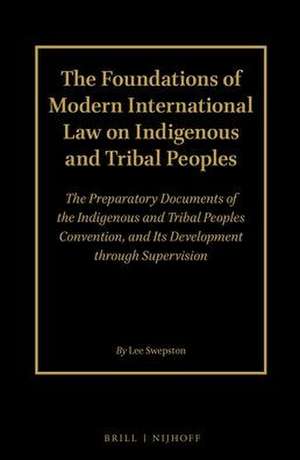The Foundations of Modern International Law on Indigenous and Tribal Peoples (2 Volume Set): The Preparatory Documents of the Indigenous and Tribal Peoples Convention, and Its Development through Supervision: Volume 1 and 2
Autor Lee Swepstonen Limba Engleză Carte – 19 sep 2018
- The Foundations of Modern International Law on Indigenous and Tribal Peoples;
The Preparatory Documents of the Indigenous and Tribal Peoples Convention, and Its Development through Supervision.
Volume 1: Basic Policy and Land Rights
isbn 9789004289055
The International Labour Organization is responsible for the only two international Conventions ever adopted for the protection of the rights and cultures of indigenous and tribal peoples. The Indigenous and Tribal Populations Convention, 1957 (No. 107) and the Indigenous and Tribal Peoples Convention, 1989 (No. 169) that revised and replaced Convention No. 107, are the only international Conventions ever adopted on the subject, and Convention No. 169 is the only one that can now be ratified. This volume, and its companion to be published at a later date, make clear that the basic concepts and the very vocabulary of international human rights on indigenous and tribal peoples derives from these two Conventions. The adoption in 2007 of the UN Declaration on the Rights Of Indigenous Peoples (UNDRIP), and the ongoing discussions in the international human rights community about the relative merits, impact and legal validity of the UN and ILO instruments, make it all the more important to understand how Convention 169 was adopted. The author of this unique study was responsible for many years for the supervision of both Conventions in the ILO’s supervisory machinery, and was intimately involved in the adoption of the 1989 instrument, as well as in international discussions on the subject of indigenous and tribal peoples.
and
- The Foundations of Modern International Law on Indigenous and Tribal Peoples;
The Preparatory Documents of the Indigenous and Tribal Peoples Convention, and Its Development through Supervision.
Volume 2: Human Rights and the Technical Articles
isbn 9789004289079
The International Labour Organization is responsible for the only two international Conventions ever adopted for the protection of the rights and cultures of indigenous and tribal peoples. The Indigenous and Tribal Populations Convention, 1957 (No. 107) and the Indigenous and Tribal Peoples Convention, 1989 (No. 169) that revised and replaced Convention No. 107, are the only international Conventions ever adopted on the subject, and Convention No. 169 is the only one that can now be ratified. This volume, together with its companion published in 2015, make clear that the basic concepts and the very vocabulary of international human rights on indigenous and tribal peoples derives from these two Conventions. The adoption in 2007 of the UN Declaration on the Rights Of Indigenous Peoples (UNDRIP), and the ongoing discussions in the international human rights community about the relative merits, impact and legal validity of the UN and ILO instruments, make it all the more important to understand how Convention 169 was adopted.
The author of this unique study was responsible for many years for the supervision of both Conventions in the ILO’s supervisory machinery, and was intimately involved in the adoption of the 1989 instrument, as well as in international discussions on the subject of indigenous and tribal peoples. In writing this two-volume study, he goes a strict “travaux” approach, and discusses the organizational precedents and the subsequent practice under these instruments.The supervision of the application of these Conventions is very largely unknown in the wider human rights community, and even in the more specialized “indigenous community” that forms a special subset of human rights activists. This guide may be of some help in redressing that situation.
Preț: 1510.36 lei
Preț vechi: 1841.91 lei
-18% Nou
Puncte Express: 2266
Preț estimativ în valută:
289.05€ • 299.47$ • 241.23£
289.05€ • 299.47$ • 241.23£
Carte indisponibilă temporar
Doresc să fiu notificat când acest titlu va fi disponibil:
Se trimite...
Preluare comenzi: 021 569.72.76
Specificații
Notă biografică
Lee Swepston is the Former Senior Advisor on Human Rights of the International Labour Office (ILO), and is now a teacher (University of Lund, Sweden and Raoul Wallenberg Institute, inter alia) and consultant. He attended the University of North Carolina at Chapel Hill and took his Juris doctor degree at Columbia University in New York. He joined the ILO in 1973, where his posts included being Regional Adviser on International Labour Standards in Africa, Human Rights Coordinator and Chief of the Equality and Employment Branch. He has written numerous books and articles on various aspects of human rights and international labour law, forced labour and child labour, freedom of association, discrimination, HIV and AIDS, migrant workers and indigenous and tribal peoples. His latest work includes a textbook on international labour law and human rights, and the first volume of the present book.
From 1973 until 2004 he was responsible in the ILO for the supervision of the Indigenous and Tribal Populations Convention, 1957 (No. 107) and for participating for the ILO in international discussions on this emerging issue. He was also responsible in the ILO for the adoption of the Indigenous and Tribal Peoples Convention, 1989 (No. 169) and for its supervision for the first 15 years after its adoption. He remains concerned with promoting the implementation and further ratification of the Convention.
From 1973 until 2004 he was responsible in the ILO for the supervision of the Indigenous and Tribal Populations Convention, 1957 (No. 107) and for participating for the ILO in international discussions on this emerging issue. He was also responsible in the ILO for the adoption of the Indigenous and Tribal Peoples Convention, 1989 (No. 169) and for its supervision for the first 15 years after its adoption. He remains concerned with promoting the implementation and further ratification of the Convention.
